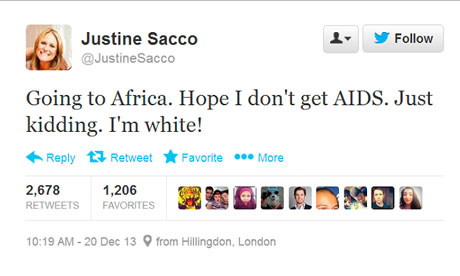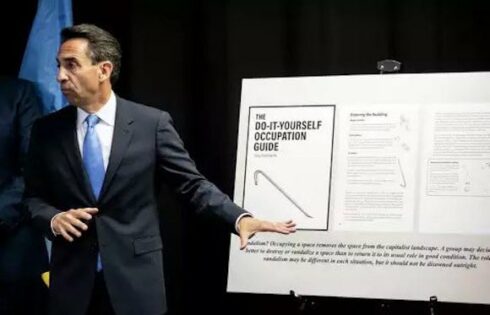
‘Outrage is a powerful political tool’
WASHINGTON – He voiced the Aflac duck until he made some off-color jokes about a tsunami. But Gilbert Gottfried can always get voice work at theater performances.
The veteran comedian played three roles Tuesday night at a preview screening of the documentary Can We Take a Joke? He made announcements over the public-address system in his trademark stage voice, appeared as himself in the film (and roasted Donald Trump), and spoke on a post-screening panel, delighting college students and their elders.
It’s college students who have the most to learn from the documentary, which examines the prospects for comedy in a society – particularly on campus – that’s increasingly addicted to taking offense.
At its core, the project by filmmakers Ted and Courtney Balaker is a love letter to pioneering stand-up comedian Lenny Bruce, explaining his relevance to a generation that has never seen someone go to jail for telling jokes.
It’s not lost on the Balakers that Bruce’s last gig was UCLA – a venue that would never host someone as crude as him today.
Ted Balaker, the film’s director and co-creator of Reason.tv’s Drew Carey Project, told the audience that he’s trying to get more screenings on college campuses this fall. It debuts in theaters July 29.
Tuesday’s screening was sponsored by the ACLU of the Nation’s Capital, Charles Koch Institute, Foundation for Individual Rights in Education (FIRE), Flying Dog Brewery and its First Amendment Society, and the National Coalition Against Censorship.
An older generation takes the mic
Can We Take a Joke? often has the feel of a lecture by a hip older professor, trying to convince his students who just returned from Coachella to care about Woodstock.
It’s notable for the absence of younger comedians on camera, which either implies that concern for free speech did not continue past Generation X, or that younger comedians can’t take any chances by openly criticizing outrage culture.
Beyond Gottfried, who turned 61 in February, the film stars edgy comedians who are middle aged or older: “Queen of Mean” Lisa Lampanelli, radio personalities Jim Norton and Adam Carolla, ex-Chelsea Lately writer Heather McDonald, magician Penn Jillette and “Stereotyped 101” co-creator Karith Foster, whose toddlers would appear to make her the youngest. (She’s also written about her “geriatric pregnancy.”)
MORE: Comedienne: Easily offended college kids are ‘on the right side of history’
They take turns relating how dangerous it has become to do comedy in the 21st century, because thin-skinned people, inexplicably, keep coming to their shows.
A prominent libertarian among his cohort, Jillette sounds typical when he says that “outrage is a powerful political tool.” He relates his astonishment when the late George Carlin told him that all the censorship was now coming from the political left.
Referring to the smartphone-enabled hordes that can ruin a person’s life over a bad joke, Gottfried deadpans that “the Internet makes me sentimental for old-time lynch mobs.”
The veteran comedians do their best to explain why free speech is the basis – not the enemy – of younger Americans’ cherished causes, particularly LGBT rights.
Brookings Institution scholar Jonathan Rauch – one of a handful of serious people on camera, and himself gay – explains why allowing hateful speech is the best way to marginalize it.
MORE: Seinfeld says college kids ‘don’t know what the f*ck they’re talking about’
The film shows Lampanelli and her gay fans merrily counter-protesting against Westboro Baptist Church members who had come to protest Lampanelli’s performance. The church members look thoroughly confused at the joyful rejoinder.
One ‘prurient’ trial made comedy safe (from police, anyway)
The comedians uniformly agree: Their careers were all made possible by the singular social critic Lenny Bruce, whose foul-mouthed and suggestive stand-up narratives in the 1950s and 1960s did not provoke a single complaint from a clubgoer – only law enforcement, according to the film.
Using old audio reels of Bruce’s stand-up and grainy footage, the film follows Bruce from city to city as he’s arrested by police for doing his act, and even goes inside the obscenity trial that got him convicted of appealing to “prurient interest.”
https://www.youtube.com/watch?v=oCplnUga0hU
What followed Bruce’s conviction – worsening health and a fatal drug overdose – practically guaranteed that comedians would never again be prosecuted for their speech, the film concludes.
The problem? The general population is the new prosecutor, judge and jury, as evidenced by the outrage mobs that ruined the lives of ordinary people whose jokes fell flat.
So You’ve Been Publicly Shamed author Jon Ronson tells the sad tale of Justine Sacco, whose context-free tweet about AIDS and white privilege got her fired (and nearly unemployable and undateable) during a flight from London to South Africa. The kicker: Sacco is a South Africa native who was mocking her own privilege in an AIDS-ravaged society.
Physical violence against student jokesters
As befits a film that was co-produced by FIRE, Can We Take a Joke? explores a few cases of campus outrage run amok – against provocateurs who would otherwise be considered “marginalized” – with the original video from their performances.
Chris Lee, a black student at the rural Washington State University, made a play he advertised as intended to offend everyone back in 2005: The Passion of the Musical. Featuring the joyful religious repetition of groin-related words that aren’t fit to print in The College Fix, the play drew severe heckling and threats from the crowd despite the presence of police.
What makes this incident stand out, as the 30-something Lee explains from his living room in the film, is that WSU paid for and organized the mass heckling (read about it from FIRE’s case file).
A more recent incident took place at Reed College, a famously free-thinking liberal arts school, when Sal Rodriguez did a stand-up act in 2012 that mocked women’s studies majors, among many others (read about it from Reed’s student paper).
The son of a Mexican immigrant, Rodriguez appears on camera just a few years later to talk about the surreal experience of being physically attacked on stage by a screaming woman.
MORE: How political correctness drove away comedians from campus
But the incident that casts the longest shadow is the University of Alaska-Fairbanks’ monthslong investigation of the student paper – and its black female editor-in-chief – following an April Fools’ edition that included an illustration of a vagina-shaped building. (She wrote the accompanying satirical article.)
How can you help? Defend the targets of Internet outrage
The crowd got to interact with Gottfried and his younger colleague Foster, in addition to the Balakers and others involved with the film, during Q&A after the screening. A few even got selfies.
Foster shared the story of a comedienne friend who was told to avoid certain subjects at the college where she was performing. “You hired me and now you don’t want me to do my job?” the friend said, according to Foster.
Courtney Balaker, a new mother, speculated that people are more offended now because parents are treating their teens with the same anxiety and protective attitude that they showed them as younger children.
Asked how ordinary people can help defend free speech, ACLU attorney and law professor Scott Michelman said they can speak out in defense of mob victims like Justine Sacco in real time.
Greg Lukianoff, the film’s executive producer and president of FIRE, told a British student that his country was “in a dead sprint” with America for the most anti-speech campuses in the world.
Gottfried said the people who love his comedy the most are the butts of his jokes, recounting that a blind Japanese woman hugged him after a set where he lampooned blind people and Japanese people.
Even the questioners got in on the jokes. A petite immigrant student at Goucher College had the panelists and audience rollicking as she told the story, in the cadence of stand-up, of how her brand of humor got her fired from her campus job.
Unsurprisingly, the panel encouraged her to try stand-up.
MORE: Student comedians are under attack in the U.K.
Like The College Fix on Facebook / Follow us on Twitter
IMAGE: Can We Take a Joke? trailer







Please join the conversation about our stories on Facebook, Twitter, Instagram, Reddit, MeWe, Rumble, Gab, Minds and Gettr.